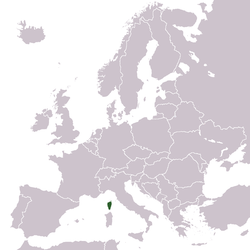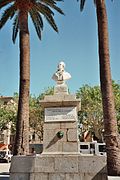- Corsican Republic
-
Corsican Republic
Ripublica CorsaUnrecognized state ← 
1755–1769  →
→

Flag Coat of arms Anthem
Dio vi Salvi ReginaLocation of Corsica in Europe Capital Corte Language(s) Italian, Corsican Government Constitutional republic General-in-Chief - 1755-1769 Pasquale Paoli Legislature Diet Historical era Age of Enlightenment - Established November 1755 - Conquered May 9, 1769 Area 8,680 km2 (3,351 sq mi) Currency soldi Today part of  France
FranceIn November 1755, Pasquale Paoli proclaimed Corsica a sovereign nation, the Corsican Republic, independent from the Republic of Genoa. He created the Corsican Constitution, which was the first constitution written under Enlightenment principles, including the first implementation of female suffrage, later revoked by the French when they took over the island in 1769. The republic created an administration, justice system, and founded an army.
Contents
Foundation
After a series of successful actions, Paoli drove the Genoese from the whole island except for a few coastal towns. He then set to work re-organizing the government, introducing many reforms. He founded a university at Corte and created a short-lived "Order of Saint-Devote" in 1757 in honour of the patron saint of the island, Saint Devota.[1]
A national parliament, or Diet, was composed of delegates elected from each district for three-year terms. Suffrage was extended to all men over the age of 25.[1] Traditionally, women had always voted in village elections for podestat i.e. village elders, and other local officials,[2] and it has been claimed that they also voted in national elections under the Republic.[3]
The Republic minted its own coins at Murato in 1761, imprinted with the Moor's Head, the traditional symbol of Corsica.
Paoli's ideas of independence, democracy and liberty gained support from such philosophers as Jean-Jacques Rousseau, Voltaire, Raynal, Mably .[4] The publication in 1766 of An Account of Corsica by James Boswell made Paoli famous throughout Europe. Diplomatic recognition was extended to Corsica by the Bey of Tunis.[5]
French invasion
In 1767, Corsica took the island of Capraia from the Genoese who, one year later, despairing of ever being able to subjugate Corsica again, sold their claim to the Kingdom of France with the Treaty of Versailles.
The French invaded Corsica the same year, and for a whole year Paoli's forces fought desperately for their new republic against the invaders. However, in May 1769, at the Battle of Ponte Novu they were defeated by vastly superior forces commanded by the Comte de Vaux, and obliged to take refuge in the Kingdom of Great Britain. French control was consolidated over the island, and in 1770 it formally became a province of France.
Aftermath
The fall of Corsica to the French was poorly received by many in Great Britain, which was Corsica's main ally and sponsor. It was seen as a failure of the Grafton Ministry that Corsica had been "lost", as it was regarded as vital to the interests of Britain in that part of the Mediterranean.[6] The Corsican Crisis severely weakened the Grafton Ministry, contributing to its ultimate downfall. A number of exiled Corsicans fought for the British during the American Revolutionary War, serving with particular distinction during the Great Siege of Gibraltar in 1782.
The aspiration for Corsican independence, along with many of the democratic principles of the Corsican Republic, were revived by Paoli in the Anglo-Corsican Kingdom of 1794-1796. On that occasion, British naval and land forces were deployed in defence of the island; however, their efforts failed and the French regained control.
To this day, some Corsican separatists such as the (now-disbanded) Armata Corsa, advocate the restoration of the island's republic.
See also
References
- ^ Gregory, Desmond (1985). The ungovernable rock: a history of the Anglo-Corsican Kingdom and its role in Britain's Mediterranean strategy during the Revolutionary War, 1793-1797. London: Fairleigh Dickinson University Press. p. 31. ISBN 0838632254.
- ^ Gregory, Desmond (1985). The ungovernable rock: a history of the Anglo-Corsican Kingdom and its role in Britain's Mediterranean strategy during the Revolutionary War, 1793-1797. London: Fairleigh Dickinson University Press. p. 19. ISBN 0838632254.
- ^ Felli, Lucien (1974). "La renaissance du Paolisme". In Bartoli, M. Pasquale Paoli, père de la patrie corse. Paris: Albatros. p. 29. http://books.google.com/books?id=EigKAQAAIAAJ. "Il est un point où le caractère précurseur des institutions paolines est particulièrement accusé, c'est celui du suffrage en ce qu'il était entendu de manière très large. Il prévoyait en effet le vote des femmes qui, à l'époque, ne votaient pas en France."
- ^ Scales, Len; Oliver Zimmer (2005). Power and the Nation in European History. Cambridge: Cambridge University Press. p. 289. ISBN 0521845807. http://books.google.com/books?id=iv41_FKFfUQC.
- ^ Thrasher, Peter Adam (1970). Pasquale Paoli: An Enlightened Hero 1725-1807. Hamden, CT: Archon Books. p. 117. ISBN 0208010319.
- ^ Simms, Brendan (2008). Three Victories and a Defeat: The Rise and Fall of the First British Empire, 1714-1783. London: Penguin Books. p. 663. ISBN 0140289848.
External links
Categories:- Former countries in Europe
- States and territories established in 1755
- States and territories disestablished in 1769
- 1769 disestablishments
- History of Corsica
- Island countries
- Former republics
- Former unrecognized countries
Wikimedia Foundation. 2010.


